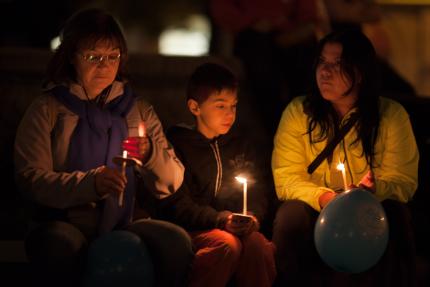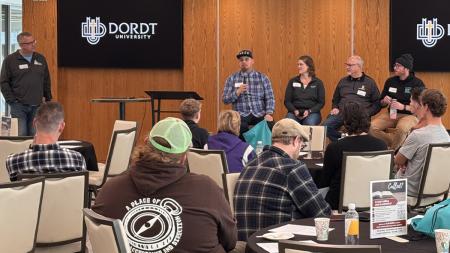Reaching Out Along the 'Highway of Tears'

Centre for Public Dialogue
Up to 50 people, many of them Aboriginal women and girls, have been killed or gone missing along a remote, 700-kilometer (450-mile) stretch of Highway 16 in British Columbia over the last 30 years.
Along this road, referred to as the “Highway of Tears,” are five CRC congregations that are taking a keen interest in an action alert sent out by the CRC’s Centre for Public Dialogue.
In this alert, the Centre is asking church members to consider supporting a recently announced Canadian government inquiry into the unsolved murders and disappearance of hundreds of Aboriginal women and girls across Canada, including along Highway 16, going as far back as the 1970s.
Among those especially interested in this inquiry is Bart Plugboer, a deacon at Houston CRC in Houston, B.C., and Diaconal Ministry Developer (DMD) for the churches that are located along Highway 16.
The churches span from Terrace CRC in Terrace, B.C., in the west to the CRC of Prince George in Prince George, B.C. in the east.
“We hope this (the action alert) helps to get the government to do something that is good. These people are made in God’s image. We are all children of the same God,” said Plugboer, who travels frequently as a DMD to the churches along Highway 16.
Because the government had been doing very little to address the issue of murdered and missing women, Plugboer joined with a Royal Canadian Mounted Police officer a year ago to set up a safe room in a motel in Houston.
“Now, if the police find a person that is along the highway after supper, they pick him or her up and put them in the room that is provided by us deacons and paid for by our church,” said Plugboer.
The room has been used three times so far. Currently, Plugboer is working with Telkwa CRC in Telkwa, B.C., which is thinking of setting up a safe house or a safe room.
The CRC action alert comes on the heels of a prayer campaign that began in February and was organized by the Canadian Aboriginal Ministry Committee to draw attention to the issue.
“I’m an Aboriginal woman and my mom is an Aboriginal woman ...The tragedy of the missing and murdered women has always been in my context of my life,” said Shannon Perez, the Justice and Reconciliation Mobilizer for Canadian Ministries who helped put together the prayer campaign.
She recalls especially becoming aware of the issue, she said, when she learned the story of Helen Betty Osborne and her murder that took place in the early 70's in Manitoba.
Then the issue became even more personal in the summer of 2014 when Perez and members of her family spent the day in a park Winnipeg.
As they were leaving, they saw several police department vehicles gathered around the nearby Red River. They later learned the police had found the body of Tina Fontaine wrapped in a plastic bag in the river.
“That experience in the park hit home,” said Perez. “Here I was at a park with innocence yet the innocence of Tina Fontaine was shattered. A few weeks later another young Aboriginal youth was left for dead along the river after being beat up twice. Her name is Rinelle Harper. She survived.”
Mike Hogeterp, director of the Centre for Public Justice, said the action alert is asking members of CRC congregations to write members of Parliament and government officials, urging them to support the investigation into the disappearances and murders.
Meanwhile, his office is asking CRC members to learn more about the issue and how it ties into trends of human trafficking, domestic abuse, alcohol and drug addiction, and how it links to the ways in which Aboriginal youth were sent to boarding schools where many of them were subject to abuse and violence.
“The government inquiry will be a difficult and extensive process no doubt,” said Hogeterp. “This inquiry will try to understand in rigorous detail the patterns of the perpetrators, and how the system of racism is a part of what has happened.”
Several years in the making, the inquiry comes out of recommendations made by Canada’s Truth and Reconciliation Commission, which investigated the legacy of oppression of First Nations people in boarding schools, and was announced last year following the election of Justin Trudeau as prime minister of Canada.
Trudeau’s administration determined to start the investigation this summer by interviewing family members of the murdered and missing.
“We are pleased to see this,” said Hogeterp. “You can’t ignore a trend as deep and significant as this as to what is happening to these precious children of God.”


